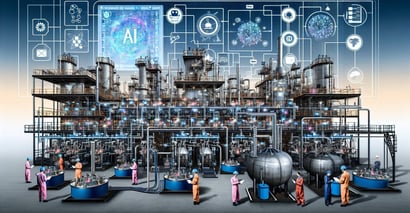AI-Powered Predictive Scheduling for Make-to-Stock Distribution
The role of production planners is pivotal in chemical manufacturing. Balancing supply and demand, optimizing resources, and ensuring timely delivery of products are among the myriad responsibilities they shoulder. However, the traditional methods of planning and scheduling often fall short in meeting the demands of modern production environments. Enter AI-powered predictive scheduling – a game-changer poised to revolutionize the way make-to-stock distribution operates in the chemical industry.
In this blog, we look into the intricacies of predictive scheduling and explore its integration with leading ERP, SCM, and MES systems like PlanetTogether, SAP, Oracle, Microsoft, Kinaxis, and Aveva. By understanding the synergies between these platforms, production planners can unlock new levels of efficiency, agility, and competitiveness in their operations.

The Evolution of Production Planning
Before looking into the realm of AI-powered predictive scheduling, let’s first examine the evolution of production planning in chemical manufacturing. Traditional approaches relied heavily on historical data, manual input, and heuristic decision-making. While these methods served their purpose in the past, they often struggled to adapt to the complexities of modern supply chains.
As manufacturing processes became more intricate and customer demands more diverse, the need for a smarter, more agile approach became evident. This led to the emergence of advanced planning and scheduling (APS) systems, which offered greater visibility, optimization capabilities, and scenario analysis. However, even APS systems faced limitations in accurately predicting future demand and dynamically adjusting production schedules in real-time.

AI-Powered Predictive Scheduling: The Game-Changer
Enter AI-powered predictive scheduling – a paradigm shift in production planning that leverages machine learning algorithms, big data analytics, and real-time feedback loops to forecast demand, optimize schedules, and mitigate disruptions proactively. Unlike traditional methods, which rely solely on historical data, predictive scheduling anticipates future trends, identifies patterns, and adapts on the fly.
At the heart of predictive scheduling lies the integration of disparate systems – from ERP and SCM to MES – into a cohesive ecosystem that facilitates seamless data exchange and collaboration. Among the leading solutions in this space is PlanetTogether, a powerful production planning and scheduling software renowned for its versatility and scalability.

Integration with Leading ERP, SCM, and MES Systems
One of the key strengths of PlanetTogether is its compatibility with a wide range of ERP, SCM, and MES systems, including SAP, Oracle, Microsoft Dynamics, Kinaxis RapidResponse, and Aveva MES. By integrating these platforms, production planners can harness the full potential of predictive scheduling and unlock new efficiencies across the supply chain.
Integration with SAP: SAP is a powerhouse in the realm of enterprise resource planning, offering comprehensive solutions for finance, procurement, production, and more. By integrating PlanetTogether with SAP, production planners can seamlessly synchronize production schedules with demand forecasts, inventory levels, and procurement plans. This enables proactive decision-making, reduces lead times, and enhances overall agility.
Integration with Oracle: Oracle is another industry giant, providing a wide array of ERP and SCM solutions tailored to the needs of chemical manufacturers. By integrating PlanetTogether with Oracle, production planners can achieve end-to-end visibility and control over their supply chain operations. From raw material procurement to finished goods distribution, every aspect of the production process is optimized for maximum efficiency and customer satisfaction.
Integration with Microsoft Dynamics: Microsoft Dynamics offers a suite of ERP and CRM solutions designed to streamline business processes and drive growth. By integrating PlanetTogether with Microsoft Dynamics, production planners can leverage the power of AI to forecast demand, allocate resources, and optimize production schedules in real-time. This ensures that customer orders are fulfilled promptly, inventory levels are optimized, and production costs are minimized.
Integration with Kinaxis RapidResponse: Kinaxis RapidResponse is a cloud-based SCM platform that enables companies to orchestrate their end-to-end supply chain in real-time. By integrating PlanetTogether with Kinaxis RapidResponse, production planners can synchronize production schedules with demand signals, inventory levels, and supplier constraints. This ensures that production capacity is utilized optimally, and customer orders are delivered on time, every time.
Integration with Aveva MES: Aveva MES is a leading manufacturing execution system that provides real-time visibility and control over production processes. By integrating PlanetTogether with Aveva MES, production planners can bridge the gap between planning and execution, ensuring that production schedules are aligned with shop floor realities. This enables proactive problem-solving, reduces downtime, and improves overall efficiency.

The Benefits of Integration
The integration between PlanetTogether and leading ERP, SCM, and MES systems offers a myriad of benefits for production planners in chemical manufacturing facilities:
Enhanced Visibility: By integrating disparate systems into a unified platform, production planners gain end-to-end visibility into their supply chain operations. This enables them to monitor key metrics, track inventory levels, and identify potential bottlenecks proactively.
Improved Decision-Making: With access to real-time data and predictive analytics, production planners can make informed decisions that drive business outcomes. Whether it's adjusting production schedules, reallocating resources, or expediting orders, every decision is backed by data-driven insights.
Increased Agility: In today's fast-paced business environment, agility is key to staying ahead of the competition. By integrating predictive scheduling with ERP, SCM, and MES systems, production planners can respond quickly to changing market dynamics, customer demands, and supply chain disruptions.
Optimal Resource Utilization: By optimizing production schedules based on demand forecasts, inventory levels, and resource constraints, production planners can maximize the efficiency of their operations. This leads to lower production costs, reduced lead times, and improved overall profitability.
Enhanced Customer Satisfaction: Ultimately, the goal of predictive scheduling is to deliver exceptional customer experiences. By ensuring that orders are fulfilled on time and in full, production planners can build trust, loyalty, and long-term relationships with their customers.
In the ever-evolving landscape of chemical manufacturing, the role of production planners is more critical than ever before. By harnessing the power of AI-powered predictive scheduling and integrating it with leading ERP, SCM, and MES systems like PlanetTogether, SAP, Oracle, Microsoft, Kinaxis, and Aveva, production planners can unlock new levels of efficiency, agility, and competitiveness in their operations.
The future of make-to-stock distribution lies in predictive scheduling – are you ready to take your manufacturing operations to the next level? Contact us today to learn more about how PlanetTogether can help you achieve your goals and drive success in your industry.